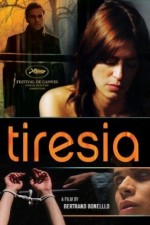
TIRESIA
France/Canada, 2003, 125 minutes, Colour.
Laurent Lucas, Clara Choveaux, Thiago Teles, Celia Catalifo, Lou Castel.
Directed by Bertrand Bonello.
It helps to have some background on the classical character, Tiresias, the blind hermaphrodite prophet of Thebes, and the various legends that led to his/her being blinded. Perhaps it won't, because many audiences will not have the patience to stay with the first half - and, if they do, and are satisfied with a forty minute section which enables us to get a hold on aspects of the plot and characters, the ending is so elliptical and rapid, that we are left with enigmas that we may or may not want to take from the cinema.
Written and directed by Montreal and Paris-based Betrand Bonello (The Pornographer), the film opens with a long volcanic sequence of molten lava, spends a great deal of time observing (and ogling) the transsexual prostitutes of Paris parks. When an obsessive and grim man imprisons the Brazilian Tiresia, the film is more coherent, the story of a collector, which ends in shocking violence. Tiresia is played by an actress and acts as a woman. In the second part, Tiresia is played by an actor and lives as a man. Laurent Lucas is the collector and it is more than an emotional jolt when we seem him vesting for a baptism. Presumably, the audience assumes this priest is the collector. The cast credits, however, indicate that he is another character played by the same actor (in the same unsmiling way that Lucas does, as in Harry, He's Here to Help and Who Killed Bambi?) What follows is a use of both the Greek mythology and allusions to the Gospels, but by that stage the film has become so studied and puzzling that the temptation is to opt out.
1. Bonello's films and their pushing limits, especially in areas of personal relationship and sexuality? The pushing of the limits in this film?
2. The film's basis on the myths of Tiresias? His being hermaphrodite? His being blind? The mythological background to his blindness? His being a prophet and an oracle? A healer? How well did the film use this mythology for the character of Tiresia: a woman in the first half, man in the second half?
3. The opening with the long scene of the volcano and the lava? Significance? The musical score, especially the use of Beethoven? The music relating to Teresa of Jesus? Pete Seeger's "Poor Little Jesus"?
4. The style of the film, the long takes, the close-ups on the individuals - making it ponderous and sometimes tedious for the audience unprepared to give it contemplative attention for long periods?
5. Terranova, in Paris, alone, sullen? His encounters with the prostitutes? The imagery of the birds, the garden? The roses? His going to the part at night with the transvestites? Searching? Pursuing Tiresia, hearing her sing? Taking her home, making it an abduction? Imprisoning her? His care of her, food, washing? Her fears, her wanting to get out? The screams? His hard-heartedness, keeping her? His not wanting any physical encounter with her? His saying he was in love with her? His realising she was a transvestite? Fearing that his reputation would be damaged if she got out, the brutality of his blinding her and casting her out?
6. Tiresia, from Brazil, in the park, singing? Going back, her prostitute's attitude, her being imprisoned, fear, the passing of time, food, washing? The story of coming from Brazil, having no papers? Her being blinded?
7. Anna finding Tiresia, bringing him home? The second part of the film where Tiresia was played by a man? Healing him, caring for his eyes, food and shelter? Friendship and conversations? The family accepting him? The neighbours? The beginnings of healings? The visit of Fr Francis, the suspicions of the church? His declaration that he was not trying to heal people but people were affected by him? A future as a blind healing prophet?
8. The family, the old man, bringing Tiresia into the family? The people being healed?
9. Fr Francis, vesting, the baptism? The visit to Tiresia and discussions? The official status of the church and its decrees?
10. The significance of the same actor playing Terranova and Fr Francis? Audiences identifying the two as the one person? Terranova as a collector and Tiresia as prey? Fr Francis as an authority figure?
11. The overall effect of the film? The difficulty of following the plot? The central second part being more comprehensible in terms of narrative? The suddenness of the ending, the bringing in of biblical themes, a seemingly virginal conception, a saviour figure? Anna as a Madonna figure